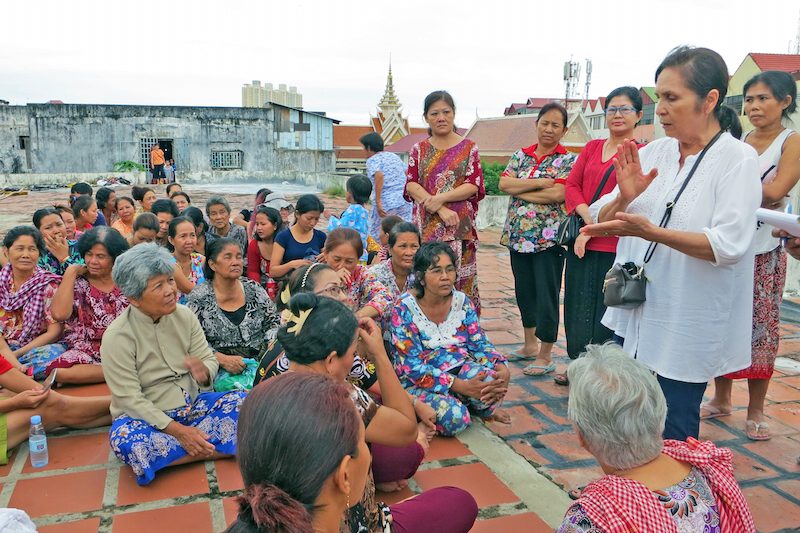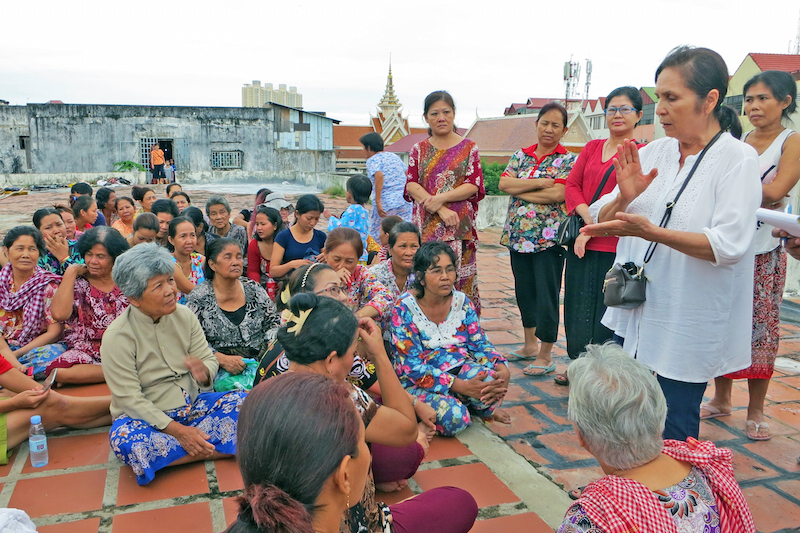For the first time since their building was condemned more than two years ago, residents of Phnom Penh’s iconic White Building met with village representatives on Sunday to hear details of the development project that will result in its demolition.
The low-income housing block built in 1963 under then-Prince Norodom Sihanouk is home to hundreds of families and small businesses. On Thursday, the government released its plan for the site, which municipal governor Pa Socheatvong declared unsafe in September 2014.

Japanese company Arakawa has been awarded a contract to build a 21-story complex for $80 million, a project expected to take four years, said a statement from the Ministry of Land Management and Urban Planning.
According to the plan, five floors will be set aside for the roughly 450 families who currently live in the White Building.
The government said that temporary resettlement housing will be provided near the Royal Phnom Penh Hospital.
“We informed them about the plan,” village representative Dy Sophannaramany, 72, said on Sunday after the informal afternoon meeting with residents on the rooftop of the decrepit housing block. “We explained the housing plan to them and asked for their stance.”
The approximately 220 villagers in attendance were instructed to fill out forms detailing their current living situation and indicate whether they would accept a home in the new building or request a buyout, she said. They will be collected on Thursday, she added, and presented to the Land Management Ministry during a meeting on November 8.
“Ninety-nine point five percent of them want money in the form of selling” their apartments and shops, Ms. Sophannaramany said, adding that she was among them. “They don’t need to have it swapped.”
“They want the money to support their families and find somewhere that they can live and build their new lives,” she added.
Officials at the Ministry of Land Management could not be reached for comment.
Residents were in broad agreement that they should be paid about $70,000 for their current spaces, Ms. Sophannaramany said, but were reluctant to let go of the building that held years of memories. Having moved in in 1980, she said she saw the White Building as a space to build a community after the Khmer Rouge was defeated.
“We came here to live with empty hands at first and to clean up together,” she said. “Our lives are attached to the building so much.”
Ren Sovanthorng, 54, echoed the village representative. When she and her husband settled into the housing complex in 1986, it was a chance to rebuild their lives.
“I will miss this building because it holds the history of me and my husband,” she said. “My husband carried rice and milled rice from Svay Ralum to come here. He really struggled.”
With the fate of the building seemingly sealed, she said she would prefer to sell her home and start anew, rather than wait for a new building to be completed.
Ieng Sotheara, managing director of Arakawa, insisted on Sunday that the new apartments offered the “best way” forward for residents.
Each unit would be 10 percent larger than their current accommodations and equipped with modern infrastructure, security and maintenance, he said, adding that the value of the property would exponentially increase after the 4-year project was completed.
“We care about these people,” he said. “We want to make sure that everything is good and everyone is happy. We want to be a good model for every developer in the future.”
After the November 8 meeting, he said, the timeline for the project would become more concrete.
Ms. Sophannaramany said the potential long-term profit would not be enough to persuade many to accept the housing proposal rather than a payout.
“Most people said they are willing to take an egg today,” she said. “They don’t want to get the whole hen tomorrow.”




